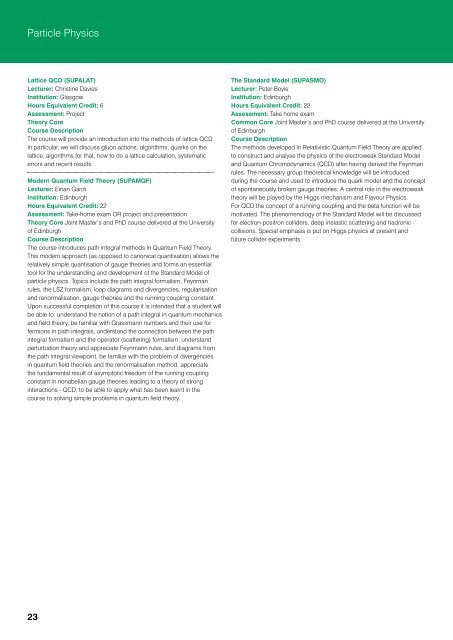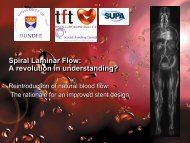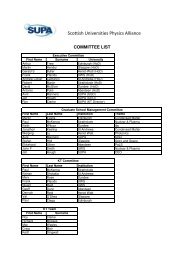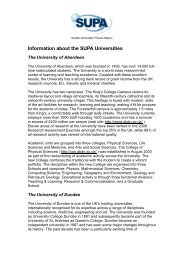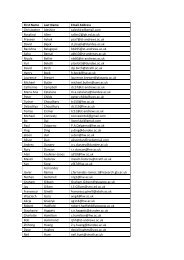Catalogue of Courses & Student Handbook - SUPA
Catalogue of Courses & Student Handbook - SUPA
Catalogue of Courses & Student Handbook - SUPA
You also want an ePaper? Increase the reach of your titles
YUMPU automatically turns print PDFs into web optimized ePapers that Google loves.
Particle Physics<br />
Lattice QCD (<strong>SUPA</strong>LAT)<br />
Lecturer: Christine Davies<br />
Institution: Glasgow<br />
Hours Equivalent Credit: 6<br />
Assessment: Project<br />
Theory Core<br />
Course Description<br />
The course will provide an introduction into the methods <strong>of</strong> lattice QCD.<br />
In particular, we will discuss gluon actions, algorithms, quarks on the<br />
lattice, algorithms for that, how to do a lattice calculation, systematic<br />
errors and recent results.<br />
Modern Quantum Field Theory (<strong>SUPA</strong>MQF)<br />
Lecturer: Einan Gardi<br />
Institution: Edinburgh<br />
Hours Equivalent Credit: 22<br />
Assessment: Take-home exam OR project and presentation<br />
Theory Core Joint Master’s and PhD course delivered at the University<br />
<strong>of</strong> Edinburgh<br />
Course Description<br />
The course introduces path integral methods in Quantum Field Theory.<br />
This modern approach (as opposed to canonical quantisation) allows the<br />
relatively simple quantisation <strong>of</strong> gauge theories and forms an essential<br />
tool for the understanding and development <strong>of</strong> the Standard Model <strong>of</strong><br />
particle physics. Topics include the path integral formalism, Feynman<br />
rules, the LSZ formalism, loop diagrams and divergencies, regularisation<br />
and renormalisation, gauge theories and the running coupling constant.<br />
Upon successful completion <strong>of</strong> this course it is intended that a student will<br />
be able to: understand the notion <strong>of</strong> a path integral in quantum mechanics<br />
and field theory, be familiar with Grassmann numbers and their use for<br />
fermions in path integrals, understand the connection between the path<br />
integral formalism and the operator (scattering) formalism, understand<br />
perturbation theory and appreciate Feynmann rules, and diagrams from<br />
the path integral viewpoint, be familiar with the problem <strong>of</strong> divergencies<br />
in quantum field theories and the renormalisation method, appreciate<br />
the fundamental result <strong>of</strong> asymptotic freedom <strong>of</strong> the running coupling<br />
constant in nonabelian gauge theories leading to a theory <strong>of</strong> strong<br />
interactions - QCD, to be able to apply what has been learnt in the<br />
course to solving simple problems in quantum field theory.<br />
The Standard Model (<strong>SUPA</strong>SMO)<br />
Lecturer: Peter Boyle<br />
Institution: Edinburgh<br />
Hours Equivalent Credit: 22<br />
Assessment: Take home exam<br />
Common Core Joint Master’s and PhD course delivered at the University<br />
<strong>of</strong> Edinburgh<br />
Course Description<br />
The methods developed in Relativistic Quantum Field Theory are applied<br />
to construct and analyse the physics <strong>of</strong> the electroweak Standard Model<br />
and Quantum Chromodynamics (QCD) after having derived the Feynman<br />
rules. The necessary group theoretical knowledge will be introduced<br />
during the course and used to introduce the quark model and the concept<br />
<strong>of</strong> spontaneously broken gauge theories. A central role in the electroweak<br />
theory will be played by the Higgs mechanism and Flavour Physics.<br />
For QCD the concept <strong>of</strong> a running coupling and the beta function will be<br />
motivated. The phenomenology <strong>of</strong> the Standard Model will be discussed<br />
for electron-positron colliders, deep inelastic scattering and hadronic<br />
collisions. Special emphasis is put on Higgs physics at present and<br />
future collider experiments.<br />
23


